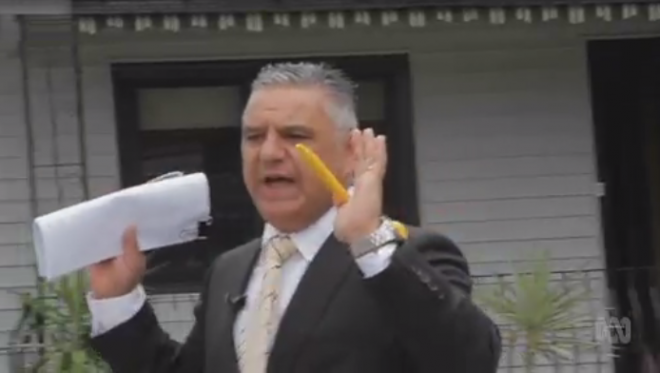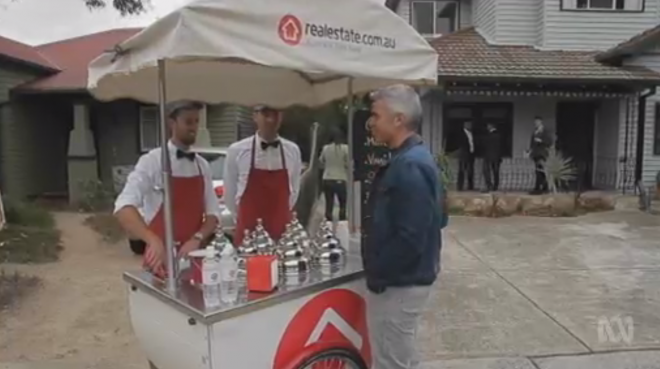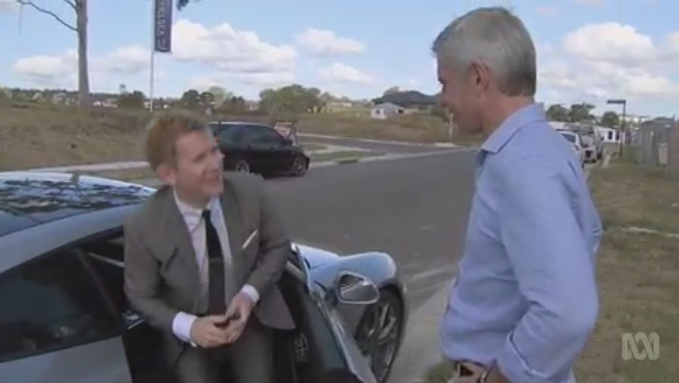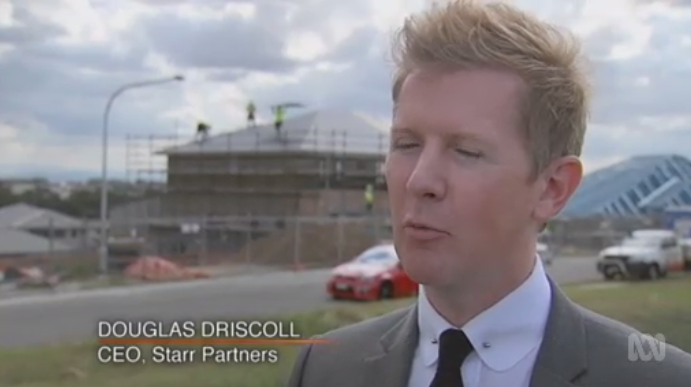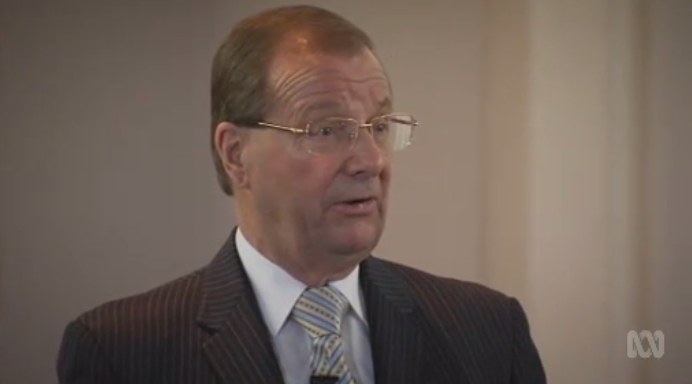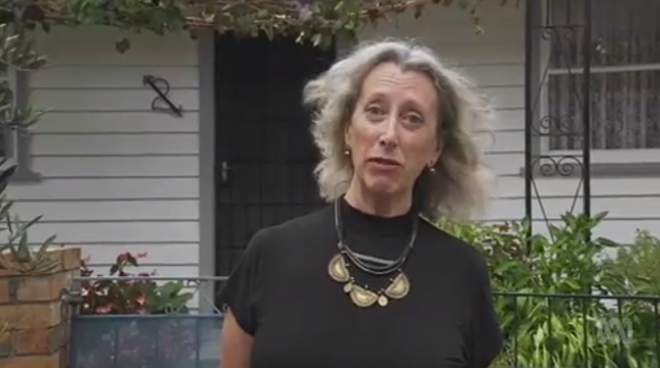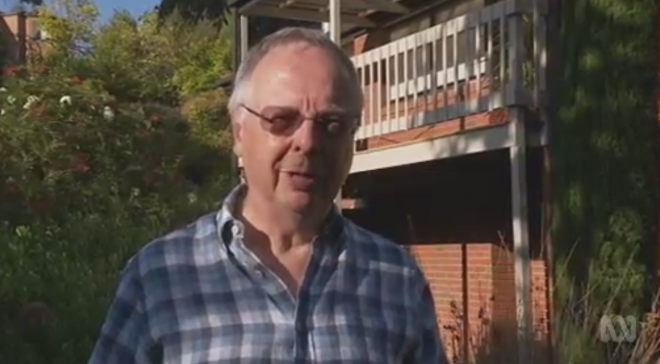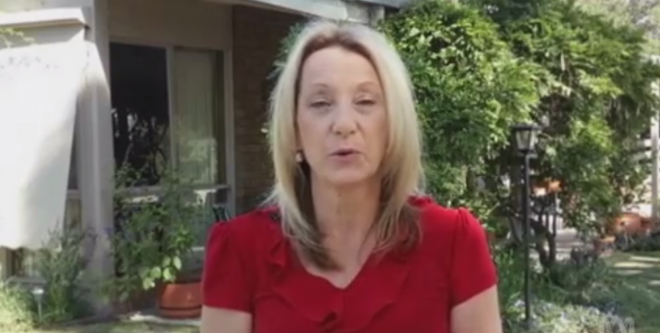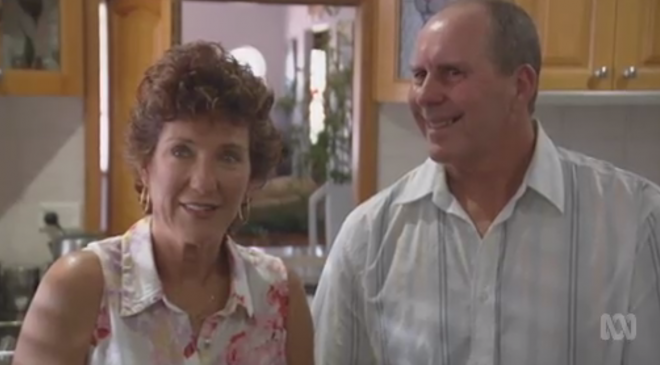The 10 Most Infuriating People From Four Corners’ Investigation Into The Housing Market
Yeah... they're mostly boomers.

Dedicated to an investigation of Australia’s increasingly fraught housing market, last night’s episode of Four Corners opened on a very stern-looking Sarah Ferguson asking if “a generation [has] been shut out of the Great Australian Dream?” “It used to be that Australians would spend three or four times their annual income on a house, now it’s 10, 20, even 30 times,” she said.
And really, it could have ended there. Ferguson could have answered her own question saying “yep, young people are fucked” and lined up the outro music. We could have even snuck in a few special episodes of The Katering Show — the extra relatable ones in which a successful women in her mid-30s openly weeps about crippling mortgage debt for a house that looks like a crack den and the other one stoically accepts the fact she’ll be renting until her parents die. It would have had the same effect.
Instead, we received a broad and equally depressing overview of the market as it stands. Reporter Ben Knight laid out the long-term effects of negative gearing and capital gains tax breaks. He showed grave concern for both young and disadvantaged people priced out of home ownership and for the market itself — one which many economists think may be heading for a Big Short-style crash. And he did all this while treating us to a infuriating spread of people who have no idea they’re part of the problem.
–
This Auctioneer
The show opens on Ben Knight’s street in an unnamed suburb of Melbourne. Knight starts to reminisce on the fact that, when he was buying his home in 2000, homes were going for around $400,000, but before he can finish that thought the bidding for a nearby house starts at $1.1 million.
The auctioneer gears into full race mode bouncing between two men, one of which appears to be in his late-20s/early-30s. People seem hesitant to bid higher than $1,170,000, so he throws his hands (complete with tiny superfluous yellow hammer) in the air and yells “It’s only money!”
–
Rob, The Man Who Won The Auction
“Look, I’m a little bit fussy on property,” Rob says, as if that’s not an incredible luxury in itself. “It takes me a long time to find something I want to buy.”
“Rob has bought and sold two houses before this,” Ben Knight adds via voiceover.
“I think, for the people in the future, it’s going to be very hard, but I think this happens in all cities. It’s just the way of the world. Things get very expensive.”
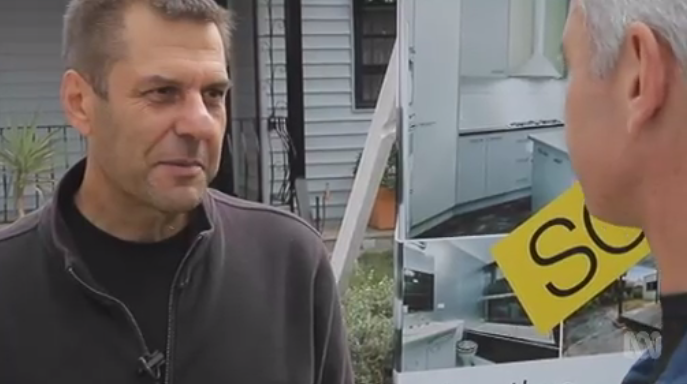
The Way Of The World would be a great film about middle-aged men shrugging at other people’s struggle.
–
Porsche Boy
Heading to the heart of the housing crisis in Sydney, Ben Knight visits Kellyville: a north-west suburb which is both an hour-long commute from the city and currently producing houses for about $1 million a pop.
“Doug Driscoll’s been doing very well selling property here,” Knight says via voiceover as someone from the set of Mad Men jumps out of a Porsche.
“Something will go on the market and within hours, there will be dozens of enquiries,” he says, overcome with ecstasy.
Ben Knight then jumps over to a house selling around the middle of the market in the closer suburb of Strathfield which would take the average income earner (on a still very decent $76,000) 29 years to pay off if they never ate. Presumably, Douglas is left to defend himself against the nearby tradies who have already “accidentally” dropped a metal beam on his car.
–
This Property Salesman
“Why are people looking at negative gearing? Because it is generous,” Ron Cross says to a room full of very sad-looking people in Melbourne. “It’s a wonderful opportunity for people to become involved in property investment. It’s a gift. The secret is to borrow money. To the young people in the audience tonight: don’t be fearful of borrowing money.”
He has a point. As many proponents of negative gearing have said, it’s a tool which can be used to anyone’s gain and many people on low-average incomes have used it to make incredible profit. However, he leaves out the fact it’s this appeal which has flooded the market with investors that are driving every price up and now completely cutting out younger people from getting a foot in the door in first place.
Lots of smiling men over 40 are very excited by his talk but a young woman, Jules McKendry, calls bullshit on it. Jules is a frustrated 25-year-old house hunter who can’t get anywhere close to a home despite saving up $150,000 while living with her mum. She deserves, at best, to slay all the investors in the room Kill Bill-style or, at worst, a little hug.
–
This Hellscpae Of Smug Baby Boomers
About halfway through, the show cut away to your mum’s last dinner party for some reason.
More on them here.
–
Karen and Wayne Phillip
Karen and Wayne Phillip seem like perfectly lovely people. They live on the Central Coast in a place with stick-on dolphins on the windows. She is a therapist. He is a retired teacher. But, with the crucial help of negative gearing, they flipped 18 houses around the country and turned $100,000 into a $4.5 million portfolio. Considering Jules has miraculously saved more than that by the age of 25 and still can’t find a place to live, I have to hate them on principle.
–
Chris Bowen’s Beard
Shadow Treasurer Chris Bowen makes some good points. He points out that investors make up a staggering 50 percent of the housing market and are facing off against home buyers disadvantaged by both negative gearing and the capital gains tax. He talks about Labor’s plan to level the playing field. But he also does all that with a Ricky Gervais beard and for that, he makes the list.
–
Ultimately, the real frustration in all of this is the fact that none of these people are really doing anything wrong. The problem is an insidious one which takes its roots in complex economic policy and is exacerbated by federal governments’ attempts to stay cosy with certain voters (it might just be a coincidence that the biggest fans of negative gearing live in Malcolm Turnbull’s electorate). Those who profit from it are doing what anyone else would in the system they have — but increasing attention is now being given to the have-nots.
Straight after the report aired last night, many young Australians began sharing their own perspectives on the issue revealing just how ludicrous the idea of home ownership is to such a large percentage of the generation. The few younger people featured on the show had all lived/are currently living with their parents in their mid-late 20s, but it should be noted that that in itself is a privileged position to be in. My dad, for instance, rents in another state. My mum got in the game late, is dealing with her own shitty mortgage, and lives in the country commuting 90 minutes each way for work. As one of the lucky ones to actually find full-time work after uni, my only way of owning a house would be to abandon it and move in with her for a decade hoping to one day be in the same less-than-ideal position.
I was the first person in my extended family to go to uni. There is no way I will be able to afford to buy a house, probably ever #4corners
— Lauren Ingram (@laureningram) May 2, 2016
I will never own my own 'home'. Unless I move back with my parents at the age of 27. #4corners
— Sarah Maunder (@s_maunder) May 2, 2016
Houses in Sydney are now 12.2x median income, and 9.7x median income in Melbourne. Go on, tell me to work harder #4corners
— Kemal Atlay (@kemal_atlay) May 2, 2016
It looks like this is the start of what will be a huge issue for the upcoming federal election and hopefully perspectives like this will soon be better understood by those who’ve had vastly different experiences. At the very least, it seems like Ben Knight is on our side. Here he is hovering over a Sydney suburb where the average house goes for $14 million in what doesn’t look unlike a fighter jet:


